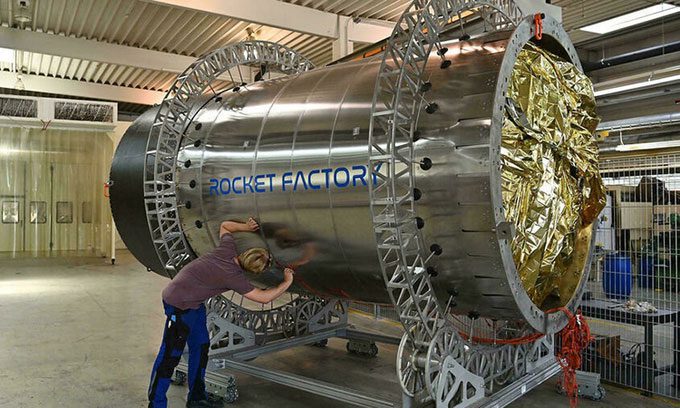In the wake of the commercial satellite boom, German startups are racing to develop launch rockets to compete with SpaceX.
Elon Musk’s SpaceX is currently the leading provider of commercial satellite launch services worldwide, with its reusable Falcon 9 rocket system demonstrating stability over the years. As a powerhouse in the automotive industry, Germany is seriously entering this space race, with at least three projects developing launch vehicles for medium and small satellites to compete with SpaceX and other major space companies.

A section of the RFA One rocket being developed by Rocket Factory Augsburg. (Photo: AFP).
At the end of July, the German startup Rocket Factory Augsburg (RFA) announced that it successfully conducted its first “static fire test” with the RFA One rocket, activating the engine on-site for 8 seconds in the town of Kiruna, far north in Sweden.
The multi-stage engine system of the RFA One has been used by SpaceX, but it has never been deployed in Europe. According to spokesperson Ibrahim Ata from Augsburg, the RFA One is capable of carrying a satellite mass of up to 1,300 kg into a polar orbit at 300 km altitude.

Simulation of the RFA One rocket launching a satellite into orbit. (Photo: RFA/Space News).
Another German company, HyImpulse, based in Baden-Wuerttemberg, also drew attention by testing an engine for 20 seconds on the Shetland Islands in May, using wax-based fuel to maximize performance.
“Our technology is advanced enough to serve the mini satellite launch market”, emphasized Christian Schmierer, co-founder of HyImpulse.
The remaining project, carried out by Isar Aerospace, based outside Munich, has not yet conducted any engine tests, but this company is well-supported. This startup has three directors and is backed by major investors such as Swiss bank Lombard Odier, venture capital firm HV Capital, and Porsche SE.
Isar Aerospace has so far accumulated over $180 million and hopes to conduct its first test launch of the “Spectrum” rocket next year. The company predicts that the satellite launch vehicle market will grow to over $35 billion by 2027, with medium and small satellites accounting for about one-third.
The three German startups aim to ultimately assemble a fleet of 20 to 40 partially reusable rockets, facilitating dozens of launches each year.




















































